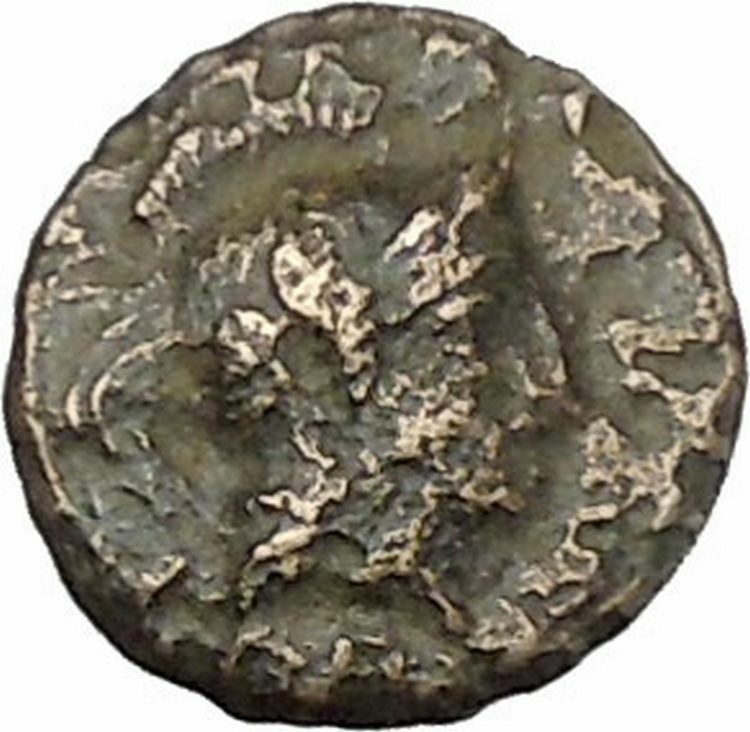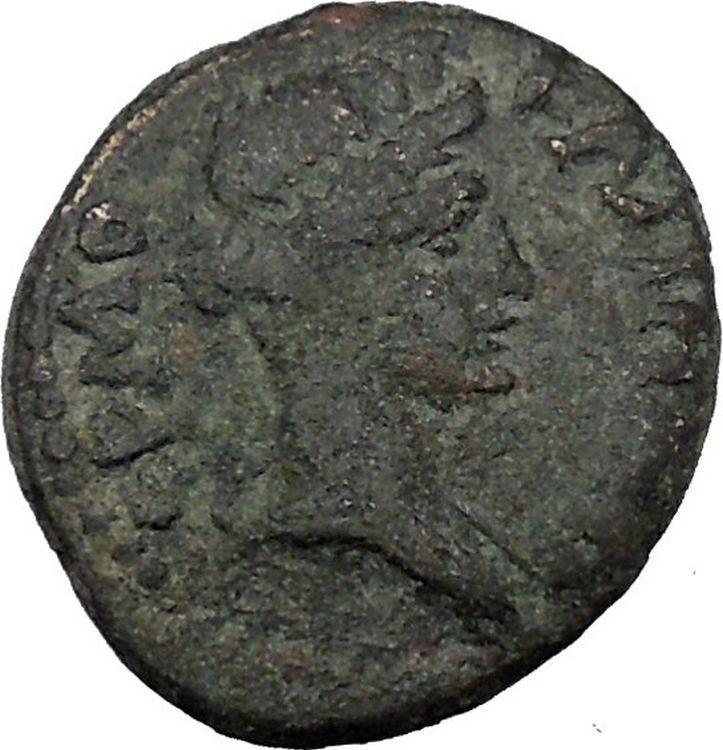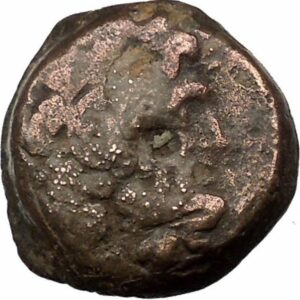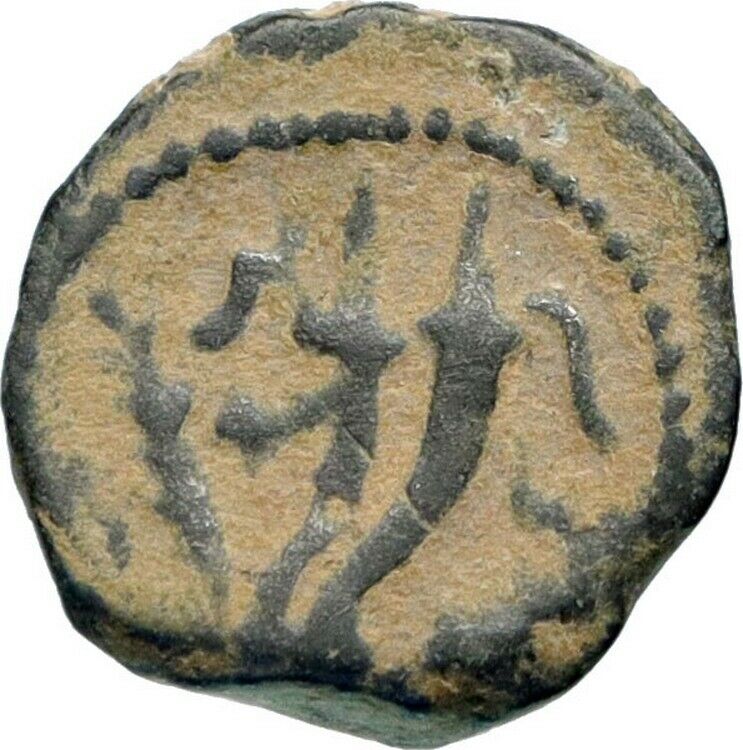|
Greek city of
Kyzikos (Cyzicus) in
Mysia
Bronze 11mm (1.07 grams) Struck circa 300-200 B.C.
Reference:
SNG Copenhagen 56; SNG BnF 429
Head of
Kore
Soteira right, hair bound in sakkos.
KY/II to left and right of
tripod
; tunny below.
A colony of Miletos, founded mid-8th century B.C., Kyzikos was
situated on the island of Arktonnesos, just off the southern coastline of the
Propontis. It occupied a position of great commercial importance and its
electrum staters, called “Kyzikenes’, circulated widely in international trade
throughout the 5th and most of the 4th century B.C. In Hellenistic times Kyzikos
preserved its prosperity by maintaining friendly relations with Pergamene kings
and, later, with Rome.
You are bidding on the exact item pictured,
provided with a Certificate of Authenticity and Lifetime Guarantee of
Authenticity.
A sacrificial tripod is a three-legged piece of
religious furniture used for offerings or other ritual procedures. As a seat or
stand, the tripod
is the most stable furniture
construction for uneven ground, hence its use is universal and ancient. It is
particularly associated with
Apollo
and the
Delphic oracle
in
ancient Greece
, and the word “tripod” comes
from the Greek meaning “three-footed.”

Apollo and
Heracles
struggle for the Delphic
tripod (Attic
black-figure
hydria
, c. 520 BC)
Ancient Greece
The most famous tripod of ancient Greece was the
Delphic
tripod from which the
Pythian priestess
took her seat to deliver the
oracles
of the deity. The seat was formed by a
circular slab on the top of the tripod, on which a branch of
laurel
was deposited when it was unoccupied by
the priestess. In this sense, by Classical times the tripod was sacred to
Apollo
. The
mytheme
of
Heracles
contesting with Apollo for the tripod
appears in vase-paintings older than the oldest written literature. The oracle
originally may have been related to the primal deity, the Earth.
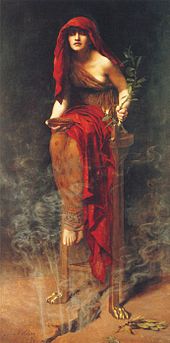
Priestess of Delphi (1891), as imagined by
John Collier
; the Pythia is
inspired by
pneuma
rising from below as she
sits on a tripod
Another well-known tripod in Delphi was the
Plataean Tripod
; it was made from a tenth part
of the spoils taken from the
Persian
army after the
Battle of Plataea
. This consisted of a golden
basin, supported by a
bronze
serpent
with three heads (or three serpents
intertwined), with a list of the states that had taken part in the war inscribed
on the coils of the serpent. The golden bowl was carried off by the
Phocians
during the
Third Sacred War
(356–346 BC); the stand was
removed by the emperor
Constantine
to
Constantinople
in 324, where in modern
Istanbul
it still can be seen in the
hippodrome
, the Atmeydanı, although in
damaged condition: the heads of the serpents have disappeared, however one is
now on display at the nearby Istanbul Archaeology Museums. The inscription,
however, has been restored almost entirely. Such tripods usually had three
ears (rings which served as handles) and frequently had a central upright as
support in addition to the three legs.
Tripods frequently are mentioned by
Homer
as prizes in
athletic games
and as complimentary gifts; in
later times, highly decorated and bearing inscriptions, they served the same
purpose. They also were used as dedicatory
offerings
to the deities, and in the dramatic
contests at the Dionysia
the victorious
choregus
(a wealthy citizen who bore the
expense of equipping and training the chorus) received a crown and a tripod. He
would either dedicate the tripod to some deity or set it upon the top of a
marble structure erected in the form of a small circular temple in a street in
Athens
, called the street of tripods,
from the large number of memorials of this kind. One of these, the
Choragic Monument of Lysicrates
, erected by him
to commemorate his victory in a dramatic contest in 335 BC, still stands. The
form of the victory tripod, now missing from the top of the Lysicrates monument,
has been rendered variously by scholars since the 18th century.
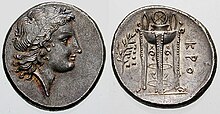
An ancient Greek coin c. 330-300 BC. Laureate head of Apollo (left)
and ornate tripod (right).
Martin L. West
writes that the sibyl at Delphi
shows many traits of
shamanistic
practices, likely inherited or
influenced from Central Asian practices. He cites her sitting in a cauldron on a
tripod, while making her prophecies, her being in an ecstatic trance state,
similar to shamans, and her utterings, unintelligible.
According to Herodotus (The Histories, I.144), the victory tripods were not
to be taken from the temple sanctuary precinct, but left there as dedications.
Sometimes the tripod was used as a support for a
lebes
or cauldron or for supporting other items
such as a vase.
-
Delphic tripod (red-figured
bell-krater
,
Paestum
, c. 330 BC)
Ancient China
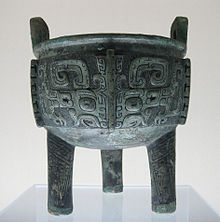
A
ding
from the late
Shang Dynasty
.
Tripod pottery have been part of the archaeological assemblage in China since
the earliest Neolithic cultures of
Cishan
and
Peiligang
in the 7th and 8th millennium BC.
Sacrificial tripods were also found in use in ancient
China
usually cast in bronze but sometimes
appearing in ceramic form. They are often referred to as “dings”
and usually have three legs, but in some usages have four legs.
The Chinese use sacrificial tripods in modern times, such as in 2005, when a
“National Unity Tripod” made of bronze was presented by the central Chinese
government to the government of northwest China’s
Xinjiang Uygur Autonomous Region
to mark its
fiftieth birthday. It was described as a traditional Chinese sacrificial vessel
symbolizing unity.
In
Greek mythology
,
Persephone is the
daughter of Zeus
and the harvest-goddess
Demeter
, and queen of the
underworld
; she was abducted by
Hades
, the god-king of the underworld.
The myth of her abduction represents her function as the
personification
of
vegetation
which shoots forth in
spring
and withdraws into the earth after
harvest; hence she is also associated with spring and with the seeds of the
fruits of the fields. Persephone as a
vegetation goddess
(Kore) and her mother
Demeter
were the central figures of the
Eleusinian mysteries
that predated the
Olympian pantheon
. In the
Linear B
(Mycenean
Greek
) tablets dated 1400-1200 BC found at
Pylos
, the “two mistresses and the king” are
mentioned;
John Chadwick
identifies these as
Demeter
, Persephone and
Poseidon
.
In
Classical Greek art
, Persephone is invariably
portrayed robed; often carrying a
sheaf
of grain. In
Roman mythology
, she is called
Proserpina
.
Cyzicus (Greek:
Κύζικος, Kyzikos, Medieval
Ottoman Turkish
: آیدینجق Aydıncıḳ)
was an ancient town of
Mysia
in
Anatolia
,
situated in
Balıkesir Province
on the shoreward side of the present peninsula of
Kapu-Dagh (Arctonnesus), which is said to have been originally an island in the
Sea of Marmara
,
and to have been artificially connected with the mainland in historic times.
Now, Cyzicus is protected by the
Turkey
‘s
Ministry of Culture, and located on the
Erdek
and
Bandırma
roads in Turkey.
//
History
The city was probably founded by
Pelasgians
from Thessaly
,
according to tradition at the coming of the
Argonauts
;
later it received many colonies from
Miletus
,
allegedly in 756 BC, but its importance began only after the Peloponnesian war,
when the decay of Athens and Miletus set in.
Alcibiades
defeated the Lacedaemonians there (410 BC). The era of its Olympiads was
reckoned from 135 or 139.
Owing to its advantageous position it speedily acquired commercial
importance, and the gold
staters
of
Cyzicus were a staple currency in the ancient world till they were superseded by
those of
Philip of Macedon
.
Its unique and characteristic coin, the Cyzicenus, was worth 28 drachmae.
During the
Peloponnesian War
(431-404 BC) Cyzicus was subject to the
Athenians
and
Lacedaemonians
alternately. In the naval
Battle of Cyzicus
in 410 during the
Peloponnesian War
, an Athenian fleet routed and completely destroyed a
Spartan fleet. At the peace of
Antalcidas
(387 BC), like the other Greek cities in Asia, it was made over to
Persia
.
Alexander
the Great
later captured it from the Persians in 334 BC.
The history of the town in Hellenistic times is closely connected with that
of the
Attalids
of Pergamon
, with whose extinction it came into direct relations with Rome.
Cyzicus was held for the Romans against king
Mithridates VI of Pontus
who besieged it with 300,000 men in 74 BC, but it
withstood him stoutly, and the siege was raised by
Lucullus
:
the loyalty of the city was rewarded by an extension of territory and other
privileges. The Romans favoured it and recognized its municipal independence.
Cyzicus was the leading city of Northern
Mysia
as far as
Troas
.

Bas-relief of a charioteer, late 6th century B.C., shows Hittite
influence at Cyzicus.
Under
Roman
Emperor
Tiberius
it was incorporated with the empire, but remained the capital of
Mysia
, afterwards
of Hellespontus, and became one of the greatest cities in the ancient world.
Cyzicus was captured temporarily by the Arabs in 675. It appears to have been
ruined by a series of earthquakes since 443 — the last in AD 1063; it began to
be deserted as early as the eleventh century and the population was transferred
to Artaki at least as early as the 13th century, when the peninsula was occupied
by the Crusades
.
In the
Ottoman era
it was part of the
caza
of Erdek
,
in the Anatolian vilayet of
Brusa
.
Ecclesiastical history
A titular see of Asia
Minor, metropolitan of the ancient ecclesiastical province of Hellespontus. As
ecclesiastical metropolis of the Roman Hellespontus province, Cyzicus had a
catalogue of bishops beginning with the first century;
Michel Le Quien
(I, 747) mentions fifty-nine. A more complete list is found in Nicodemos, in the
Greek “Office of St. Emilian” (Constantinople, 1876), 34-36, which has
eighty-five names. Of particular importance are the famous
Arian
;
Eunomius of Cyzicus
;
Saint Dalmatius
;
Proclus of Constantinople
and
Germanus of
Auxerre
, who became Patriarchs of Constantinople; and Saint Emilian, a
martyr in the eighth century. Another Saint who came from Cyzicus is Saint
Tryphaena of Cyzicus
. Tryphaena is the patron saint of the city.
Gelasius
,
a historian of Arianism, who wrote about 475, was born at Cyzicus.
Lequien
(III, 941) mentions a Latin bishop in 1477.
Cyzicus is still a
metropolitan title
for the Greek Orthodox, the metropolitan residing at
Artake (Erdek), a little port on the western shore of the peninsula. Opposite to
Artake is another port, Peramos (Perama), where an Assumptionist Father founded
a Greek parish. At Panormos (Panderma), another more important port nine miles
(14 km) south-east of the ruins of Cyzicus (10,000 inhabitants), there is a
Catholic Armenian parish. At the Dardanelles there is also a Latin parish. It
remains a Catholic titular see.
Monuments
The site amid the marshes of Balkiz Serai is known as Bal-Kiz and
entirely uninhabited, though under cultivation. The principal extant ruins are
the walls, dating from the fourth century, which are traceable for nearly their
whole extent, and the substructures of the temple of
Hadrian
, the
ruins of a Roman aqueduct and a theatre.
The picturesque amphitheatre, intersected by a stream, built in the third
century B.C., was one of the largest in the world; its diameter was nearly
500 feet (150 m). Of this magnificent building, sometimes ranked among the seven
wonders of the ancient world, thirty-one immense columns still stood erect in
1444. These have since been carried away piecemeal for building purposes.
Colossal foundations of a temple dedicated to the Emperor
Hadrian
are
still visible: the columns were 21.35 metres high (about 70 feet), while the
highest known elsewhere, those at
Baalbek
in
Syria are only 19.35 metres (about 63 feet).
The monuments of Cyzicus were used by the Byzantine emperor Justinian as a
quarry for the building of his Saint Sophia cathedral, and were still exploited
by the Ottomans.
|











